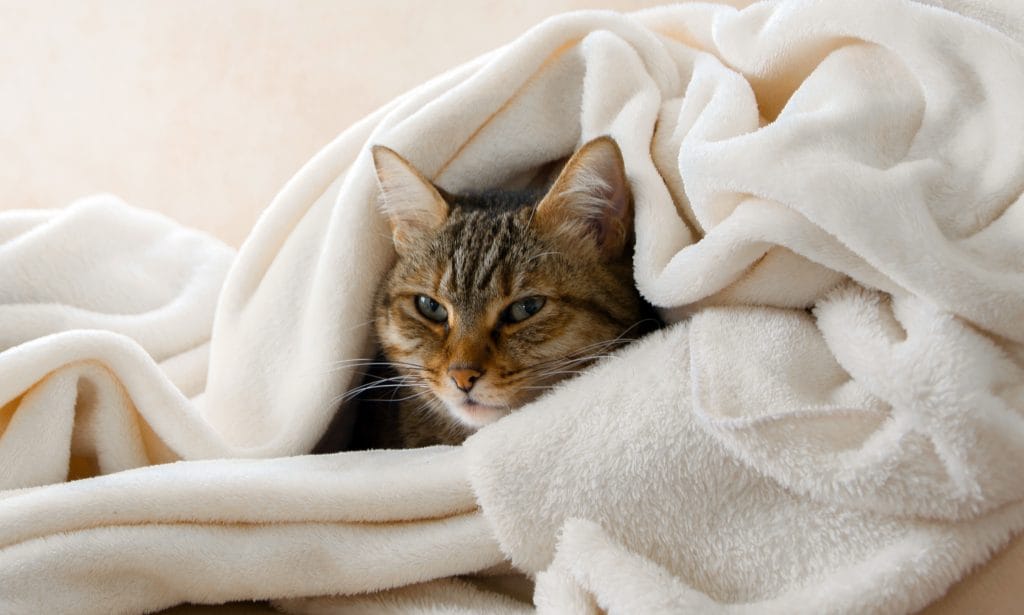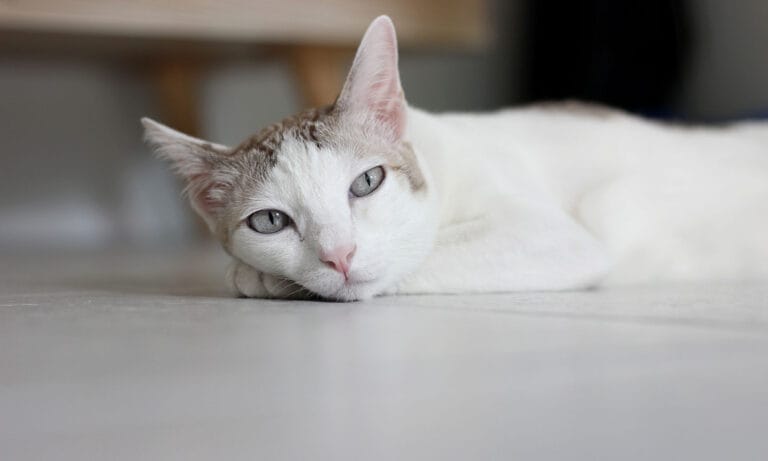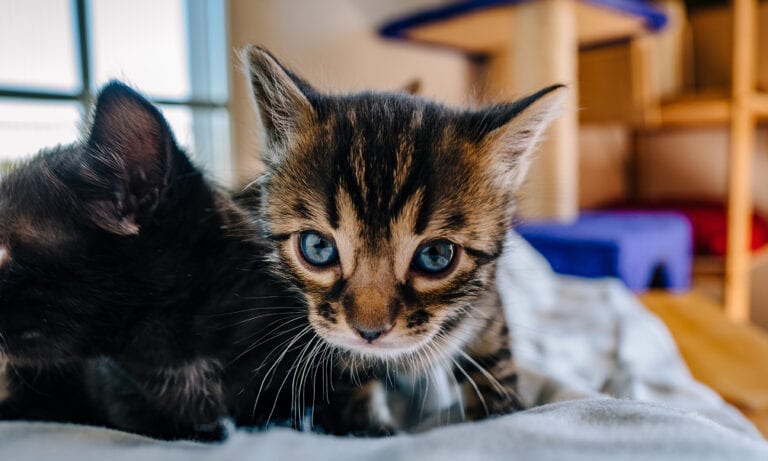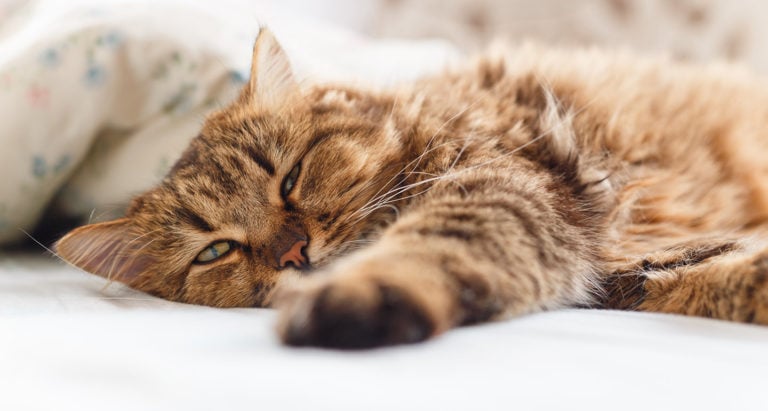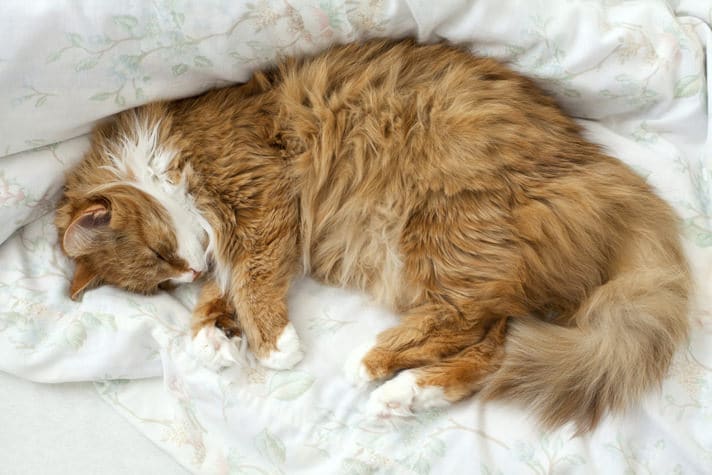SPLAT! Ugh. There it is again. You step out of bed and right into it—another puddle of clear vomit, courtesy of kitty. And always on the carpet, too. Why can’t they puke on the easy-to-clean linoleum?
After you clean up your cat's mess and sit down to your morning coffee, you start to wonder: "Is frequent cat vomiting normal? And why is my cat throwing up clear liquid? Is this just something that comes with the territory of being a cat parent, or do we need to see the vet?"
Sometimes, the answers are quite simple and obvious. Perhaps you just changed your cat’s food and they refuse to eat it, which can result in an upset stomach, in which case the liquid would be yellow. But other times, much more detective work is required since there are many reasons your cat might be throwing up clearing liquid.
What Causes Cats to Throw Up Clear Liquid?
Clear liquid vomit is a sign that the cat is bringing up fluid, often stomach acid and other gastric juices, from the digestive tract. Occasionally, if the kitty is vomiting right after drinking a large amount of water, she will also vomit clear liquid—namely, the water she just drank.
Most of the time, however, what we are seeing when we look at that sticky puddle of clear liquid on the paper towel is the cat’s stomach fluid mixed with some mucus from the esophagus (the “tube” which connects the mouth to the stomach). There are several causes of chronic vomiting in cats, and many can result in puddles of clear liquid.
Some of the most common causes of cat vomiting include:
- Parasites
- Indigestion with nausea (sometimes kitty overate, or the last meal just didn’t sit well)
- Hairball, which can irritate the digestive tract and trigger some vomiting (with or without a hairball in that clear liquid)
- New food or other dietary changes
- Allergic reactions
- Changes in your cat’s feeding schedule
- Eating too quickly
Sometimes, however, the underlying causes can be more serious and even potentially life-threatening. Other possible causes of your cat vomiting clear liquid include:
- An intestinal blockage/foreign bodies in the intestinal tract
- Metabolic problems (such as hyperthyroidism, diabetes or kidney disease)
- Inflammatory bowel disease
- Gastritis
- Pancreatitis
- Cancer
When Should I See a Vet About My Cat’s Vomiting?
See a vet when your cat does any of the following:
- Vomits more than once a week
- Shows any additional symptoms, especially weight loss, diarrhea, excessive thirst, lethargy, drooling, lack of appetite
- If the vomiting persists more than a few weeks, even without any additional problems
- Vomiting each time she eats or drinks (this may be an emergency and should be addressed immediately)
- If the cat if trying to but unable to vomit, which could mean they ate a foreign object, like string or part of a toy or other foreign object
Kitties that aren’t feeling well clearly should be seen sooner rather than later–and you should also check the puddles of vomit for any tinge of color.
- Red tinges may indicate that there is some blood in the vomit.
- Green can come from lower in the gastrointestinal tract and may indicate a slightly more serious problem.
It's much better to catch and address a problem early, rather than leaving it to worsen.
What Can I Do to Help My Cat If They're Throwing Up Clear Liquid?
The best thing you can do to help your cat is try to get to the root of the problem, so you can correct it and/or get your cat the treatment they needs.
Often, that means going to the vet for diagnostic testing to get the full picture of your pet’s health. Additional signs, such as weight loss (even if minimal) or diarrhea are very important to note, so be sure to provide your veterinarian a complete history, even if it doesn’t seem to be totally relevant to the problem at hand.
Your veterinarian will perform a thorough exam—palpating the abdomen, thyroid gland and kidneys—all of which could be involved in vomiting.
Blood pressure, weight checks and a fecal examination are also an important part of this initial screening.
If there are additional symptoms, the vomiting is severe or persistent, or your veterinarian finds additional concerns on physical examination, additional testing such as x-rays and bloodwork will likely also be recommended.
X-rays and blood tests can clue your veterinarian in on medical issues that may involve organ function (liver and kidneys) as well as the endocrine system (thyroid).
For more severe cases, or those not answered through routine screening, your veterinarian may recommend specific gastrointestinal function tests to look at digestive absorption and pancreatic levels. In addition to these specialized tests, an abdominal ultrasound can be immensely useful to visualize the organ systems and help pinpoint the underlying problem.
Once a diagnosis is reached, it is much more straightforward to tailor a customized treatment plan.
Better Safe Than Sorry
Read More
Share:
